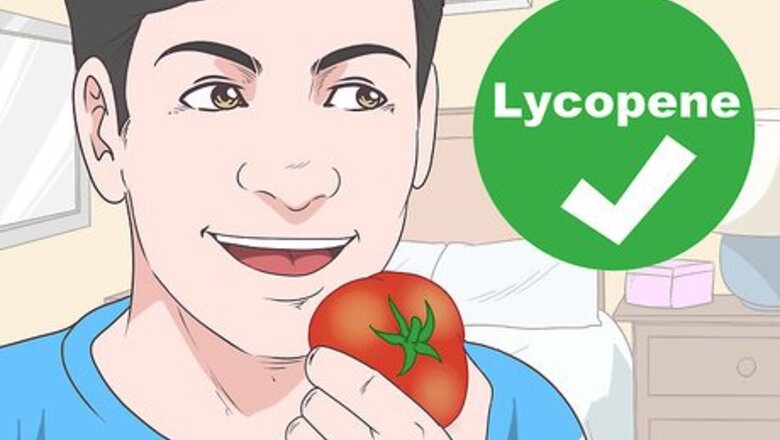
views
X
Research source
Controlling DHT through Diet
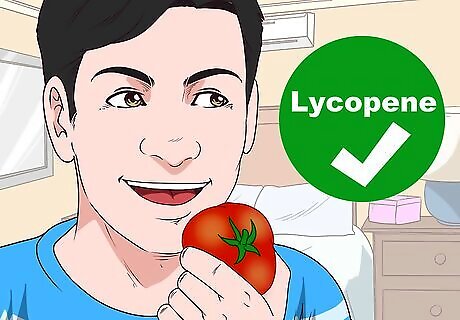
Include tomatoes in sauces. Tomatoes are high in lycopene, which is a natural DHT blocker. Lycopene is absorbed more efficiently from cooked tomatoes than from raw tomatoes. While a slice of tomato on your sandwich will help, a hearty tomato sauce over pasta is better. Carrots, mangoes, and watermelon are also good sources of lycopene.
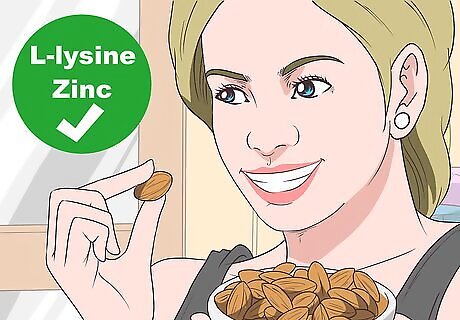
Snack on nuts such as almonds and cashews. Other substances in food that naturally inhibit DHT, including L-lysine and zinc, can be found in almonds, peanuts, pecans, walnuts, and cashews. Including nuts in your diet on a daily basis can help naturally reduce your DHT levels. Zinc is also found in leafy green vegetables, such as kale and spinach.
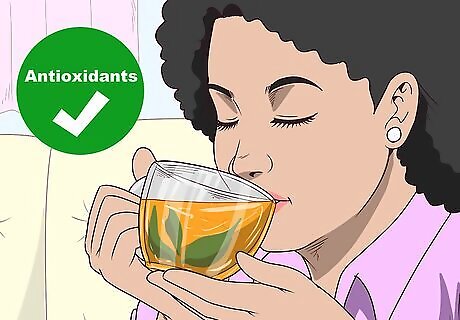
Drink green tea. Green tea is rich in antioxidants, and also helps slow or even stop the conversion of testosterone into DHT. Other hot beverages, including black tea and coffee, have a similar effect. For best results, drink organic, whole leaf teas. Avoid processed green tea "drinks," which may have less than 10 percent tea. You also want to avoid adding sugars or artificial sweeteners to your tea.
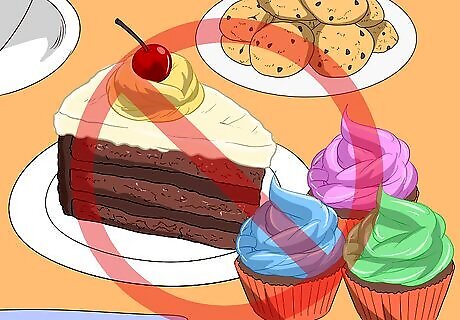
Eliminate sugar from your diet. Sugar causes inflammation and increases your body's production of DHT. Too much sugar in your diet will cancel out any benefit you get from other foods. Staying away from added sugars and sweets, such as cookies and candy, may seem pretty easy. But watch out for packaged and processed foods, which may contain sugar even though they don't taste particularly sweet.

Moderate your caffeine intake. Your morning cup of coffee can help lower DHT production. However, consuming too much caffeine can have the opposite effect. Too much caffeine may also lead to hormone imbalances and dehydration, which inhibit hair growth. Stay away from caffeinated sodas, which also have sugar and other chemicals that can actually increase DHT production.
Using Medicines and Supplements
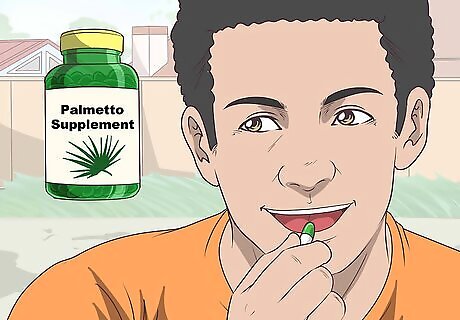
Take a saw palmetto supplement. Saw palmetto naturally blocks DHT production by inhibiting the function of 5-alpha-reductase type II, the enzyme that converts testosterone into DHT. Taking a 320-milligram supplement each day can also improve your hair growth. While saw palmetto won't work as quickly as prescription medication, it costs less and may be more convenient to take.
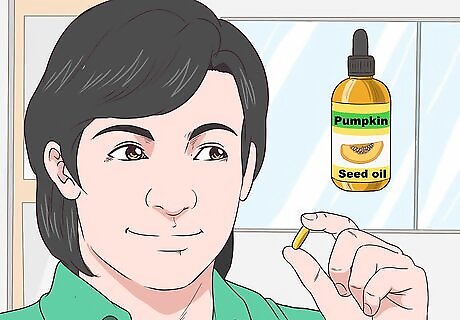
Try pumpkin seed oil. Pumpkin seed oil is another natural DHT blocker, although it may not be as efficient as saw palmetto. Unlike saw palmetto, the effects of pumpkin seed oil have been studied primarily in rats, rather than in human test subjects. Pumpkin seed oil is licensed as a treatment of prostate disorders in Germany and the United States. You can also eat a handful of pumpkin seeds each day if you want to consume more pumpkin seed oil, although you won't get as much of the oil as you do if you take a supplement in pill form. Roasting pumpkin seeds can reduce some of the beneficial properties.
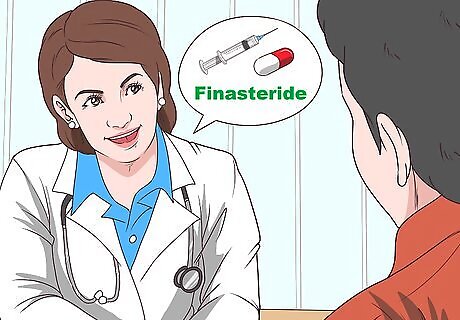
Talk to your doctor about finasteride. Finasteride, which is also sold under the brand-name Propecia, is a medication approved by the FDA to treat hair loss, specifically male pattern baldness. You can get injections or take it in pill form. Finasteride acts on enzymes that concentrate in your hair follicles, inhibiting the production of DHT. Finasteride can stop baldness from progressing, and in some cases cause new hair growth.
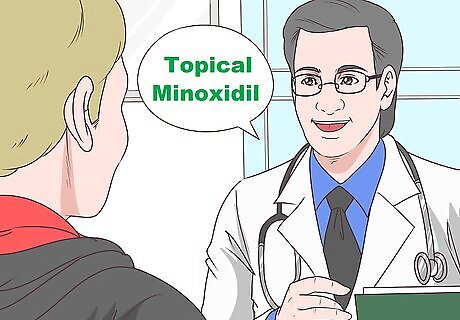
Ask your doctor about topical minoxidil (Rogaine) 2% or oral Finasteride. One potential consequence of high DHT is hair loss on the top of your head. Treatments like minoxidil or Finasteride can help reduce hair loss and even encourage hair growth in some cases. Talk to your doctor in advance of starting a new medication, though, to make sure it won't interact with any drugs you currently take or cause other unwanted side effects. Some potential side effects of these treatments may include a reduction in libido, reduced ability to maintain an erection, and a decrease in ejaculate.
Making Lifestyle Changes

Exercise 3 to 5 days a week. Being overweight and living a sedentary lifestyle puts you at an increased risk for prostate cancer. Start a regular exercise program, even if it's just walking for 20 minutes every other day. Add resistance training to strengthen your muscles. Interval training may be a good choice if you don't have a lot of spare time to devote to training and exercise.

Schedule time for rest and relaxation. Not having a good balance between work and play can increase stress levels, which in turn causes your body to produce more DHT. Set aside 15 or 20 minutes each day to do something that is fun for you. Choose a restful, calming activity, such as reading a book, coloring, or working a jigsaw puzzle. You also want to make sure you're getting enough sleep. Too little sleep can also increase your stress level, leading to increased DHT levels.
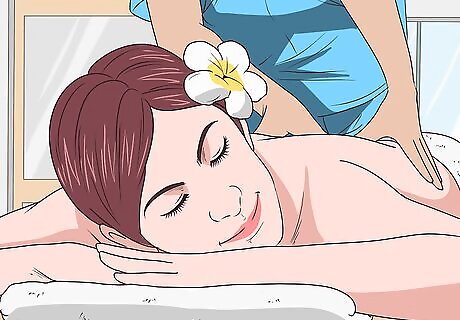
Get a massage to reduce stress. Stress may cause your body to convert more testosterone to DHT. A massage not only reduces overall stress, it can also stimulate and improve circulation, which can encourage hair growth. Try a massage every other week for a couple of months and see if you notice any improvement in your overall stress level.
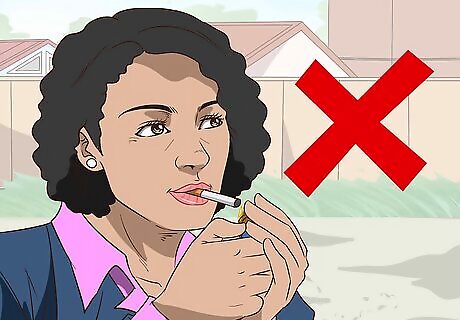
Quit smoking. On top of the other health risks of smoking, smokers also have higher DHT levels than non-smokers. If you have elevated DHT levels and you smoke, quitting can help normalize your body's DHT production. Because cigarette smoking increases levels of DHT and other hormones, it may cause an increased risk of prostate cancer (although some studies have shown the opposite). Smoking does increase the likelihood of death from prostate cancer. Smoking in and of itself also causes hair loss, regardless of the effect of smoking on DHT levels.




















Comments
0 comment